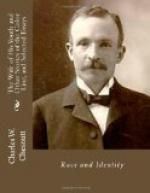Time, we are told, heals all diseases, rights all wrongs, and is the only cure for this one. It is a cowardly argument. These people are entitled to their rights to-day, while they are yet alive to enjoy them; and it is poor statesmanship and worse morals to nurse a present evil and thrust it forward upon a future generation for correction. The nation can no more honestly do this than it could thrust back upon a past generation the responsibility for slavery. It had to meet that responsibility; it ought to meet this one.
Education has been put forward as the great corrective—preferably industrial education. The intellect of the whites is to be educated to the point where they will so appreciate the blessings of liberty and equality, as of their own motion to enlarge and defend the Negro’s rights. The Negroes, on the other hand, are to be so trained as to make them, not equal with the whites in any way—God save the mark!—this would be unthinkable!—but so useful to the community that the whites will protect them rather than lose their valuable services. Some few enthusiasts go so far as to maintain that by virtue of education the Negro will, in time, become strong enough to protect himself against any aggression of the whites; this, it may be said, is a strictly Northern view.
It is not quite clearly apparent how education alone, in the ordinary meaning of the word, is to solve, in any appreciable time, the problem of the relations of Southern white and black people. The need of education of all kinds for both races is wofully apparent. But men and nations have been free without being learned, and there have been educated slaves. Liberty has been known to languish where culture had reached a very high development. Nations do not first become rich and learned and then free, but the lesson of history has been that they first become free and then rich and learned, and oftentimes fall back into slavery again because of too great wealth, and the resulting luxury and carelessness of civic virtues. The process of education has been going on rapidly in the Southern States since the Civil War, and yet, if we take superficial indications, the rights of the Negroes are at a lower ebb than at any time during the thirty-five years of their freedom, and the race prejudice more intense and uncompromising. It is not apparent that educated Southerners are less rancorous than others in their speech concerning the Negro, or less hostile in their attitude toward his rights. It is their voice alone that we have heard in this discussion; and if, as they state, they are liberal in their views as compared with the more ignorant whites, then God save the Negro!
I was told, in so many words, two years ago, by the Superintendent of Public Schools of a Southern city that “there was no place in the modern world for the Negro, except under the ground.” If gentlemen holding such opinions are to instruct the white youth of the South, would it be at all surprising if these, later on, should devote a portion of their leisure to the improvement of civilization by putting under the ground as many of this superfluous race as possible?




